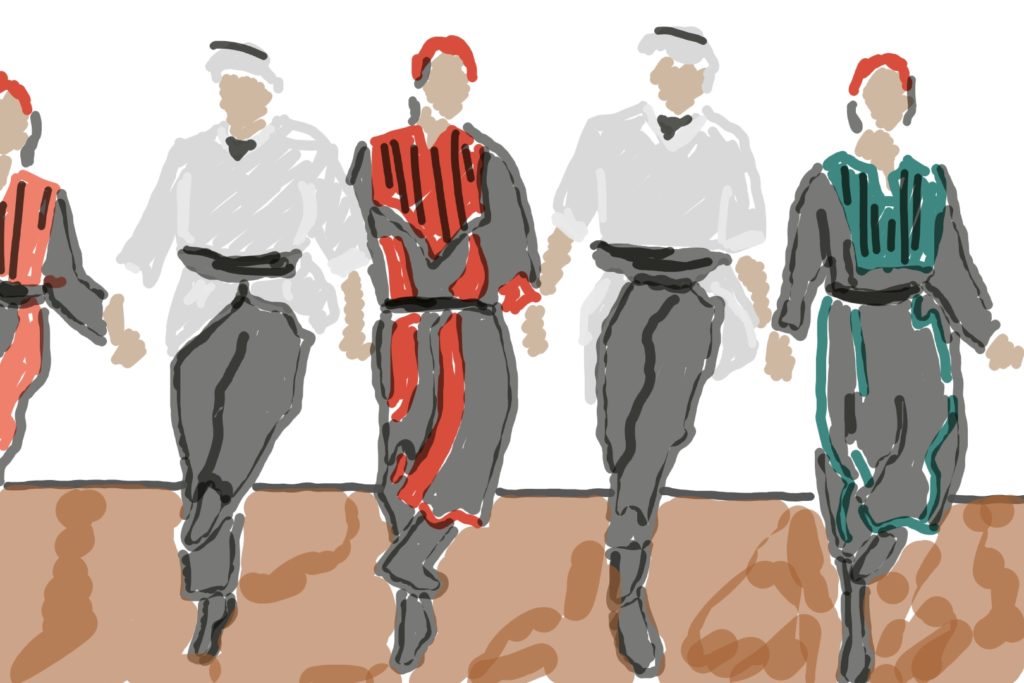El-Funoun Dance Troupe فرقة الفنون الشعبية الفلسطينية Part 2 Posted by yasmine on Sep 1, 2021 in Arabic Language, Culture, folklore
Welcome back to part two of this post about the Palestinian folklore group called فِرْقة الفنون الشَّعبية الفِلَسطينية El-Funoun Dance Troupe. We’ll continue listening to the rest of the short interviews in the clip while following along with the transcription, then answer a few questions.
🎇 فرقة الفنون الشعبية الفلسطينية🎇
.عضو من الفرقة: بجوز كانت بدياتي في الفرقة هي انو أنا حابب أدبك وخلص، صارت اكتر كأنو جزء من حياتي
✨Are you familiar with دَبْكة ?
Dabke دبكة is an Arab folk dance that combines circle dance الرقص في دائرة and line dancing الرقص في خط and is widely performed at weddings الأعراس/حفلات الزفاف and other joyous occasions in various parts of the Middle East. Perhaps, if you are invited to an event such as an Arab wedding or graduation, you can join in the دبكة. After a few tries, you’re bound to pick it up. It’s a lot of fun! 😊
Can you find the verb in this sentence which means “to dance Dabke”?
عضو من الفرقة: بالنسبة إلي، إني أكون جزء من هذا التاريخ الي بتكتبه فرقة الفنون التاريخ الثقافي والتراثي، بالنسبة الي، هذا فخر كافي يعني
What makes this speaker feel “فخر” to be in this dance troupe?
كما وأن هذا اليوم يمر وفي حدقات أعيننا دموع شديد التماسك، ونحن على وشك فك هذا الستار دون أربعة من زملائنا الذين غيبهم عنا الإحتلال بسبب الإعتقال
Why are there four members unable to participate in this performance?
عضو من الفرقة: اليوم في أعضاء في فرق بينهم تقريباً عشرين سنة بين أكبر واحد وما بين أصغر واحد بالفرقة، وهذا الحكي بيعني إنو في أجيال موجودة على المسرح وإن كانت الطاقة متكاملة ولكن في أجيال مختلفة على المسرح
What makes the speaker say that there are multiple generations dancing on stage at once?
✨Note: Notice that most of the speech in this clip is in the Levantine dialect. The people being interviewed are describing their personal experiences and relationships with the dance group and tend to express this in dialect. Yet, when the speaker at the podium gives a formal introduction before the performance, he uses modern standard Arabic.
Translation:
Group member: My beginnings in the troupe were most likely about just wanting to dance Dabke. It became more than that, as it is part of my life.
Group member: For me, to be part of this history that El-Funoun troupe writes of cultural history and heritage, for me, that is enough pride.
Also, as this day passes, and in the pupils of our eyes we have very united tears, we are about to open this curtain without four of our colleagues who are absent from us due to being arrested under the occupation.
Group member: Today, there are members who are about twenty years apart between the eldest and youngest in the troupe. And this means that there are generations on the stage. Although the energy is unified, there are different generations on the stage.
I hope you found this post interesting in that it gave you a glimpse into Palestinian folklore dancing and helped you practice more of your Arabic comprehension skills. Till next week, happy Arabic learning! 😊

Build vocabulary, practice pronunciation, and more with Transparent Language Online. Available anytime, anywhere, on any device.




